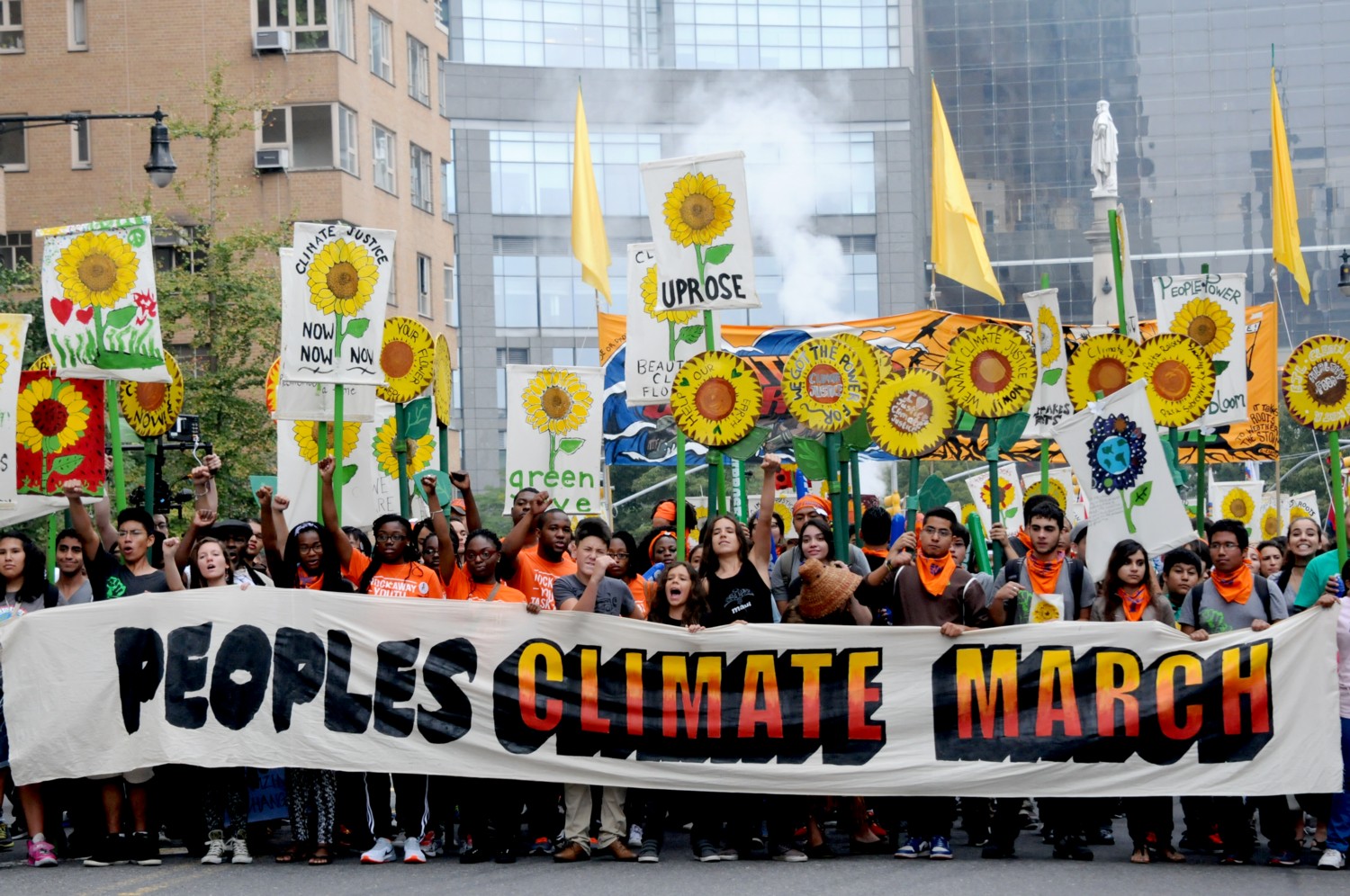
Even as the House Republicans, following the Senate, passed two laws nullifying the Obama Administrations efforts to reduce greenhouse gas emissions from power plants, Obama continued his campaign at the COP21 Climate Change Summit in Paris to bring more than 150 countries together in commitments intended to keep the planet from exceeding 2 degrees Centigrade – a level of warming that would prove catastrophic.
And while Republicans insist that “There is no crisis because I don’t believe it” (Chris Christie), or that the earth is always changing and therefore there is nothing to worry about (Marco Rubio), or that worrying about climate change “Is one of the dumbest things I’ve ever heard” (Donald Trump) and that efforts to transition the economy away from dependence on dirty Fossil Fuels to clean renewables will “destroy” the economy (Mitch McConnell, who is desperate to preserve dirty coal mines in Kentucky and West Virginia), some of the biggest, most important businesses in the US (certainly not Koch Industries) are pledging to support climate action, and make significant investments in developing clean technologies.
The White House just announced additional commitments from 73 companies from across the American economy who are joining the American Business Act on Climate Pledge. With this announcement, a total of 154 companies will have signed the American Business Act on Climate Pledge to demonstrate their support for action on climate change and the conclusion of a climate change agreement in Paris that takes a strong step forward toward a low-carbon, sustainable future. These 154 companies have operations in all 50 states, employ nearly 11 million people, represent more than $4.2 trillion in annual revenue, and have a combined market capitalization of over $7 trillion.
By signing the American Business Act on Climate pledge, these companies are:
- Voicing support for a strong Paris outcome. The pledge recognizes those countries that have already put forward climate targets, and voices support for a strong outcome in the Paris climate negotiations.
- Demonstrating an ongoing commitment to climate action. As part of this initiative, each company is announcing significant pledges to reduce their emissions, increase low-carbon investments, deploy more clean energy, and take other actions to build more sustainable businesses and tackle climate change.
These pledges include ambitious, company-specific goals such as:
- Reducing emissions by as much as 50 percent,
- Reducing water usage by as much as 80 percent,
- Achieving zero waste-to-landfill,
- Purchasing 100 percent renewable energy, and
- Pursuing zero net deforestation in supply chains.
- Setting an example for their peers. Today’s announcements builds on the launch of the American Business Act on Climate Pledge in July, and the second round of announcements in October.
The impacts of climate change are already being felt worldwide. Nineteen of the 20 hottest years on record occurred in the past two decades. Countries and communities around the world are already being affected by deeper, more persistent droughts, pounded by more severe weather, inundated by bigger storm surges, and imperiled by more frequent and dangerous wildfires. Rising temperatures can lead to more smog, longer allergy seasons, and an increased incidence of extreme-weather-related injuries, all of which imperil public health, particularly for vulnerable populations like children, the elderly, the sick, the poor, and some communities of color. No corner of the planet and no sector of the global economy will remain unaffected by climate change in the years ahead.
Climate change is a global challenge that demands a global response, and President Obama is committed to leading the fight. The President’s Climate Action Plan, when fully implemented, will cut nearly 6 billion tons of carbon pollution through 2030, an amount equivalent to taking all the cars in the United States off the road for more than 4 years. The Clean Power Plan, the most significant domestic step any President has ever taken to combat climate change, will reduce emissions from the energy sector by 32% by 2030. And while the United States is leading on the international stage and the federal government is doing its part to combat climate change, hundreds of private companies, local governments, and foundations have stepped up to increase energy efficiency, boost low-carbon investing, and make solar energy more accessible to low-income Americans.
The measures taken by the public and private sectors enabled President Obama to set an ambitious but achievable goal of reducing greenhouse gas emissions economy-wide by 26-28% by 2025 last November. And in the eleven months since, we’ve seen unprecedented global momentum in the fight against climate change.
To date, more than 180 countries representing nearly 95% of global carbon emissions have reported post-2020 climate policies to the United Nations. This includes the major economies like the U.S., China, the European Union and India and it includes a large number of smaller economies, developing nations, island states and tropical countries – some of whom are the most vulnerable to the impacts of climate change.
“As the world looks toward Paris, President Obama is committed to building on this momentum, with American leadership at all levels – the federal government, state and local governments and the private sector,” the White House stated.
* * *
THE AMERICAN BUSINESS ACT ON CLIMATE PLEDGE
We applaud the growing number of countries that have already set ambitious targets for climate action. In this context, we support the conclusion of a climate change agreement in Paris that takes a strong step forward toward a low-carbon, sustainable future.
We recognize that delaying action on climate change will be costly in economic and human terms, while accelerating the transition to a low-carbon economy will produce multiple benefits with regard to sustainable economic growth, public health, resilience to natural disasters, and the health of the global environment.
Today, the following companies have joined the pledge and their detailed commitments can be viewed at: www.whitehouse.gov/ClimatePledge
| 21ST CENTURY FOX |
| 365 RETAIL MARKETS |
| ACER AMERICA |
| ADOBE |
| AGILE SOURCING PARTNERS |
| AIRBNB |
| AKAMAI |
| ALL STAR SERVICES |
| AMAZON
AMD |
| AMERICAN HONDA MOTOR COMPANY |
| AVERY DENNISON |
| BEN & JERRY’S |
| BHPBILLITON |
| BIO-AMBER |
| BMW NA |
| BNY MELLON |
| BURNS & MCDONNELL |
| CANTALOUPE SYSTEMS |
| CANTEEN & COMPASS GROUP |
| CH2M |
| CISCO SYSTEMS, INC. |
| CRAIG COMMUNICATIONS |
| DANFOSS |
| DUPONT |
| EDP RENEWABLES NORTH AMERICA |
| ENEL GREEN POWER NORTH AMERICA |
| EQUINIX |
| FRHAM |
| GAMESA |
| GENENTECH |
| GOURMET COFFEE SERVICE |
| GREENWOOD ENERGY |
| IHG |
| INTERFACE |
| INTERNATIONAL FLAVORS & FRAGRANCES |
| JETBLUE |
| JM HUBER CORPORATION |
| KAISER PERMANENTE |
| KELLY SERVICES |
| KIMBALL ELECTRONICS |
| KOHL’S DEPARTMENT STORES |
| KPMG |
| LEGRAND NA |
| LENOVO |
| MESA ASSOCIATES |
| MGM RESORTS |
| MONDELEZ INTERNATIONAL |
| NATIONAL GRID |
| NEWS CORP |
| NOVARTIS |
| NRG |
| ORMAT TECHNOLOGIES |
| PATHEON |
| PROLOGIS |
| RIO TINTO |
| RM2 |
| ROYAL VENDING |
| SKYONIC |
| STAPLES |
| SWITCH COMMUNICATIONS |
| SYMANTEC |
| TESLA MOTORS |
| TRI-ALPHA ENERGY |
| UNDERGROUND CONSTRUCTION |
| UNITED TECHNOLOGIES |
| VALLEY ELECTRIC ASSOCIATION |
| VERIZON COMMUNICATIONS |
| VF CORPORATION |
| VOLVO GROUP NORTH AMERICA |
| THE WITTERN GROUP |
| XYLEM |
The following companies have previously joined the American Business Act on Climate pledge:
| ABENGOA BIOENERGY US |
| AEMETIS |
| ALCOA |
| AMERICAN EXPRESS
APPLE |
| AT&T |
| AUTODESK |
| BANK OF AMERICA |
| BERKSHIRE HATHAWAY ENERGY |
| BEST BUY |
| BIOGEN |
| BLOOMBERG |
| CA TECHNOLOGIES |
| CALPINE |
| CAMPOS BROTHERS FARMS |
| CARGILL |
| COCA-COLA |
| COX |
| DELL |
| DISNEY |
| DSM NORTH AMERICA |
| EMC CORPORATION |
| ENER-G RUDOX |
| ENERGY OPTIMIZERS |
| FULCRUM BIOENERGY |
| GE |
| GENERAL MILLS |
| GENERAL MOTORS |
| GOLDMAN SACHS |
| HERSHEY’S |
| HP |
| IBERDROLA USA |
| IBM |
| IKEA USA |
| INGERSOLL RAND |
| INTEL |
| INTEX SOLUTIONS |
| INTREN |
| INVENERGY |
| JOHNSON & JOHNSON |
| JOHNSON CONTROLS |
| KELLOGGS
KEYSTONE ELECTRICAL MANUFACTURING |
| KINGSPAN INSULATED PANELS INC |
| LAKESHORE LEARNING |
| LAM RESEARCH |
| LEVI STRAUSS & CO. |
| L’OREAL USA |
| MARS |
| MCDONALDS |
| MICROSOFT |
| MONSANTO |
| NATIONAL LABEL |
| NESTLE USA |
| NIKE |
| NOVOZYMES |
| ONE3LED |
| PACIFIC ETHANOL |
| PEPSI |
| PG&E |
| POET |
| PORTLAND GENERAL ELECTRIC |
| PROCTOR & GAMBLE |
| PWC US |
| QUALCOMM |
| RICOH USA |
| SALESFORCE.COM |
| SCHNEIDER ELECTRIC |
| SIEMENS USA |
| SONY USA |
| STARBUCKS |
| SYNGENTA/QCCP |
| TARGET |
| TRIGLOBAL ENERGY |
| UNILEVER |
| UPS |
| WAL-MART |
| XEROX |


